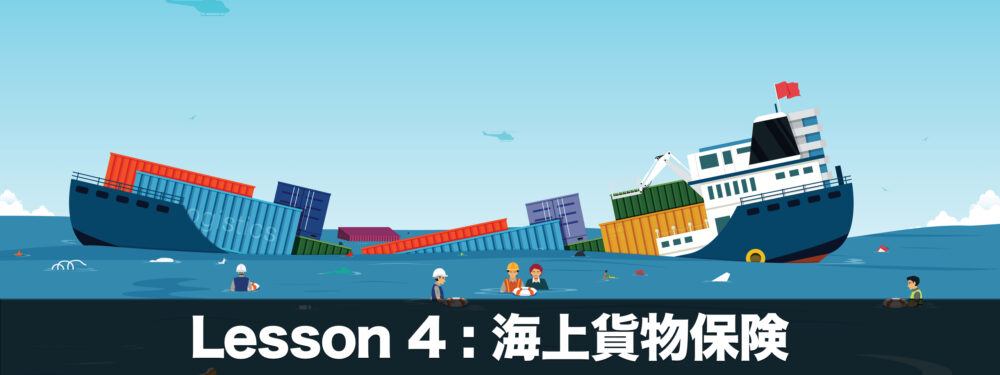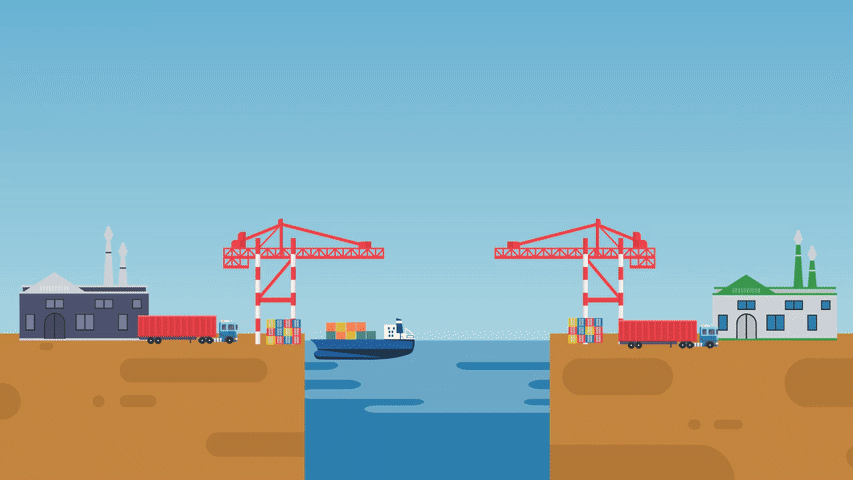4-1. Overview of Cargo Insurance

Overview

The contents are unexpectedly extensive.





Learning Points
- Cargo Marine Insurance
- Basic Coverage
- Insurance Period
- Insurers, Policyholders, and Insureds
- Insured Value and Premium
Cargo Marine Insurance

Cargo transported internationally is exposed to various risks, such as damage during transportation and vessel accidents.
Marine cargo insurance compensates for damage to cargo caused by unexpected accidents.


One of the Risk Avoidance Measures
International transportation carries a higher risk of damage than domestic transportation. The potential for significant damages is also greater.
Therefore, having marine cargo insurance is crucial to mitigate potential risks.


Difference between Two Insurance
Marine Cargo Insurance is sometimes mistaken for Export Credit Insurance (Trade Credit Insurance); however, the latter is designed to mitigate risks associated with international trade and investment.
Export Credit Insurance
Export Credit Insurance policy covers:
- Uncollectible payments
- Additional compensation in case of freight rate increases caused by war or emergencies
Marine Cargo Insurance covers cargo incidents, while Export/Trade Credit Insurance is designed for transaction issues.
Whether or not you need marine cargo insurance or export credit insurance depends on the Incoterms used.

Basic Coverage
Marine cargo insurance covers air, land, rail, and vessel transportation, not just ships.

Specific details of marine cargo insurance coverage are as follows:
- Fire, explosion, sinking, and stranding of vessels
- Capsizing and derailment of land transportation equipment
- Total loss due to submergence or fall during loading/unloading
- Water intrusion into transportation equipment, storage areas, etc., due to flood damage
- Earthquakes, volcanic eruption, lightning
- Other damage (wet damage, breakage, bending, denting, theft, leakage, shortage, contamination, mixing, etc.)



ICC (A), (B), and (C)
The insurance terms are primarily defined by the Institute Cargo Clauses (ICC), established by the Institute of London Underwriters.
- ICC(A) ≒ A/R (All Risks)
- ICC(B) ≒ WA (With Average)
- ICC(C) ≒ FPA (Free from Particular Average)
These clauses define the coverage. You have to confirm the required scope of coverage and select the appropriate insurance conditions.


Insurance Period

One of the defining features of cargo insurance is that it is section-based rather than time-based.

In the case of export
Commencement Date: When the cargo is moved for loading after being placed in the warehouse or storage location specified in the insurance contract.
Expiration Date: When unloading is completed at the warehouse or storage location at the destination specified in the insurance contract.
Typically, the coverage expires when unloading is completed at the designated destination.
However, if, for any reason, the cargo is not transported to the final storage location and the following certain period has elapsed, the coverage also terminates at that point.
- Maritime Transport: 60 days
- Air Transport: 30 days
In the case of Import
Commencement Date: When the risk burden is shifted to the importer as specified in the Incoterms
Expiration Date: When unloading is completed at the warehouse or storage location at the destination specified in the insurance contract.
Insurer
An insurer is an insurance company that handles marine cargo insurance. Every company has its unique insurance policies and special contracts.
They can deal with both:
- Companies
- Individuals
In addition, there are various insurance coverage methods, like:
- Per cargo
- Monthly
- Fixed-term
- Blanket coverage
Policyholders
A policyholder is a party who purchases insurance from an insurance company. The policyholder can be either the exporter or importer of the cargo.
As we have learned, Incoterms determine which party (exporter or importer) contracts the insurance.
For example:
- CIF: The exporter is responsible for contracting insurance
- FOB: The importer is responsible for contracting insurance


Insured
An insured is a party who suffers an economic loss caused by damage to cargo during transit. The insured has the right to file a claim.
Insured Value and Insurance Premium

The coverage amount insured by cargo marine insurance is predetermined. Let’s also check the method for calculating the insurance premium.

Insured Value
The insured value (coverage amount) is the maximum amount an insurance company will pay out in case of a covered loss or damage.
This is typically calculated as CIF Value x 110%.
This value considers:
- Potential additional costs
- Losses that the insured party may incur
The extra 10% covers factors such as potential resale profit that the importer might have gained if the cargo arrived safely and other miscellaneous expenses associated with the shipment.


How to Calculate Insurance Premium
An insurance premium is the amount of money an individual or a company pays to an insurance company in exchange for insurance coverage.
This is calculated by multiplying the insurance rate by the insured amount.
Example:
・Product’s CIF value: A thousand dollars
・Insurance rate is 0.5%
The premium would be calculated as follows:
$10,000 × 110% × 0.5% = $ 55

Summary
In this topic, we have explained Marine Cargo Insurance. The party responsible for arranging insurance depends on the agreed Incoterms between the exporter and importer.
When entering a trade, it is important to thoroughly review and understand the necessary coverage to manage the risks effectively.

Enhanced Learning with Videos
Test Yourself
Reinforce your understanding of this topic by working through the exercises. Attempting the exercises without referring to the material as much as possible is advisable.




